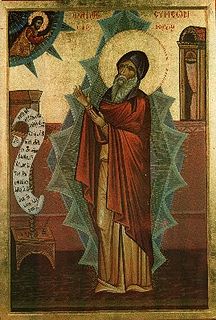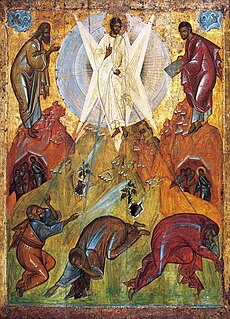Related Research Articles

The First Council of Constantinople was a council of Christian bishops convened in Constantinople in AD 381 by the Roman Emperor Theodosius I. This second ecumenical council, an effort to attain consensus in the church through an assembly representing all of Christendom, except for the Western Church, confirmed the Nicene Creed, expanding the doctrine thereof to produce the Niceno-Constantinopolitan Creed, and dealt with sundry other matters. It met from May to July 381 in the Church of Hagia Irene and was affirmed as ecumenical in 451 at the Council of Chalcedon.

Gregory of Nazianzus, also known as Gregory the Theologian or Gregory Nazianzen, was a 4th-century Archbishop of Constantinople, and theologian. He is widely considered the most accomplished rhetorical stylist of the patristic age. As a classically trained orator and philosopher he infused Hellenism into the early church, establishing the paradigm of Byzantine theologians and church officials. Gregory of Nazianzus was the patron saint of medieval Bosnia before the Catholic conquest when he was replaced by Gregory the Great.

Basil of Caesarea, also called Saint Basil the Great, was an East Roman bishop of Caesarea Mazaca in Cappadocia, Asia Minor. He was an influential theologian who supported the Nicene Creed and opposed the heresies of the early Christian church, fighting against both Arianism and the followers of Apollinaris of Laodicea. His ability to balance his theological convictions with his political connections made Basil a powerful advocate for the Nicene position.

Georges Vasilievich Florovsky was an Orthodox Christian priest, theologian, historian and ecumenist. Born in Yelisavetgrad, in the Kherson Governorate of the Russian Empire, he spent his working life in Paris (1920–1949) and New York (1949–1979). With Sergei Bulgakov, Vladimir Lossky, Justin Popović and Dumitru Stăniloae he was one of the more influential Orthodox Christian theologians of the mid-20th century. He was particularly concerned that modern Christian theology might receive inspiration from the lively intellectual debates of the patristic traditions of the undivided Church rather than from later Scholastic or Reformation categories of thought.
Patristics or patrology is the study of the early Christian writers who are designated Church Fathers. The names derive from the combined forms of Latin pater and Greek patḗr (father). The period is generally considered to run from the end of New Testament times or end of the Apostolic Age to either AD 451 or to the Second Council of Nicaea in 787.

John Zizioulas is a Greek Orthodox prelate. He is the current titular Metropolitan bishop of Pergamon of the Ecumenical Patriarchate of Constantinople. He is one of the most influential Orthodox Christian theologians today.

John Meyendorff was a leading theologian of the Orthodox Church of America as well as a writer and teacher. He served as the dean of St. Vladimir's Orthodox Theological Seminary in the United States until June 30, 1992.

In Palamite theology, there is a distinction between the essence (ousia) and the energies (energeia) of God. It was first formulated by Gregory Palamas (1296–1359) as part of his defense of the Athonite monastic practice of hesychasmos against the charge of heresy brought by the humanist scholar and theologian Barlaam of Calabria.

Symeon the New Theologian was a Byzantine Christian monk and poet who was the last of three saints canonized by the Eastern Orthodox church and given the title of "Theologian". "Theologian" was not applied to Symeon in the modern academic sense of theological study; the title was designed only to recognize someone who spoke from personal experience of the vision of God. One of his principal teachings was that humans could and should experience theoria.

Vladimir Nikolayevich Lossky was an Eastern Orthodox theologian in exile from Russia. He emphasized theosis as the main principle of Eastern Orthodox Christianity.

Caesarius of Nazianzus was a prominent physician and politician. He is best known as the younger brother of Gregory of Nazianzus. He is recognized as a saint in the Eastern Orthodox and the Catholic Church.

Kallistos Ware is an English bishop and theologian of the Eastern Orthodox Church. Since 1982, he has held the titular bishopric of Diokleia in Phrygia, later made a titular metropolitan bishopric in 2007, under the Ecumenical Patriarchate of Constantinople. He is one of the best-known contemporary Eastern Orthodox hierarchs and theologians. From 1966 to 2001, he was Spalding Lecturer of Eastern Orthodox Studies at the University of Oxford.

John Behr is a British Eastern Orthodox priest and theologian. Since 2020, he has served as the Regius Professor of Humanity at the University of Aberdeen. He is the former Dean of St. Vladimir's Orthodox Theological Seminary, where he was the Director of the Master of Theology Program and the Father Georges Florovsky Distinguished Professor of Patristics. He was ordained to the diaconate on 8 September 2001 and the priesthood on 14 September 2001. He is the editor of the Patristic Series released by St. Vladimir's Press. He was elected dean of the seminary on 18 November 2006 and served from 2007 until 2017 when he was named Father Georges Florovsky Distinguished Professor of Patristics.

The Three Hierarchs of Eastern Christianity refers to Basil the Great, Gregory the Theologian and John Chrysostom. They were highly influential bishops of the early church who played pivotal roles in shaping Christian theology. In Eastern Christianity they are also known as the Three Great Hierarchs and Ecumenical Teachers, while in Roman Catholicism the three are honored as Doctors of the Church. The three are venerated as saints in Eastern Orthodoxy, Catholicism, Anglicanism, and other Christian churches.

In Eastern Orthodox Christian theology, the Tabor Light is the light revealed on Mount Tabor at the Transfiguration of Jesus, identified with the light seen by Paul at his conversion.
Brian Edward Daley, S.J. is an American Catholic priest, Jesuit, and theologian. He is currently the Catherine F. Huisking Professor of Theology (Emeritus) at the University of Notre Dame and was the recipient of a Ratzinger Prize for Theology in 2012.
The history of Eastern Orthodox Christian theology begins with the life of Jesus and the forming of the Christian Church. Major events include the Chalcedonian schism of 451 with the Oriental Orthodox miaphysites, the Iconoclast controversy of the 8th and 9th centuries, the Photian schism (863-867), the Great Schism between East and West, and the Hesychast controversy. The period after the end of the Second World War in 1945 saw a re-engagement with the Greek, and more recently Syriac Fathers that included a rediscovery of the theological works of St. Gregory Palamas, which has resulted in a renewal of Orthodox theology in the 20th and 21st centuries.

20th century Eastern Orthodox theology has been dominated by neo-Palamism, the revival of St. Palamas and hesychasm. John Behr characterizes Orthodox theology as having been "reborn in the twentieth century." Norman Russell describes Orthodox theology as having been dominated by an "arid scholasticism" for several centuries after the fall of Constantinople. Russell describes the postwar re-engagement of modern Greek theologians with the Greek Fathers, which occurred with the help of diaspora theologians and Western patristic scholars. A significant component of this re-engagement with the Greek Fathers has been a rediscovery of Palamas by Greek theologians; Palamas had previously been given less attention than the other Fathers.

The Church Fathers, Early Church Fathers, Christian Fathers, or Fathers of the Church were ancient and influential Christian theologians and writers who established the intellectual and doctrinal foundations of Christianity. The historical period in which they worked became known as the Patristic Era and spans approximately from the late 1st to mid 8th centuries, flourishing in particular during the 4th and 5th centuries, when Christianity was in the process of establishing itself as the state church of the Roman Empire.
The Popular Patristics Series is a book series published by St. Vladimir's Seminary Press consisting of English translations of mainly first millennium Christian texts. It currently comprises 61 volumes. The texts are principally translated from Greek, but some Latin, Syriac and Coptic writers are included. John Behr has edited the series since its inception.
References
- 1 2 3 4 5 "John McGuckin". Department of Religion. Columbia University in the City of New York. Archived from the original on 2016-06-20. Retrieved 2016-06-06.
- ↑ "Fr. John McGuckin Delivers Fr. Alexander Schmemann Lecture". St. Vladimir's Orthodox Theological Seminary. Retrieved 26 February 2014.
- ↑ McGuckin, John Anthony (2011). "The Encyclopedia of Eastern Orthodox Christianity - volume 1" . Retrieved 18 April 2019.
- ↑ McGuckin, John Anthony (2011). The Encyclopedia of Eastern Orthodox Christianity - volume 2. ISBN 9781405185394 . Retrieved 18 April 2019.